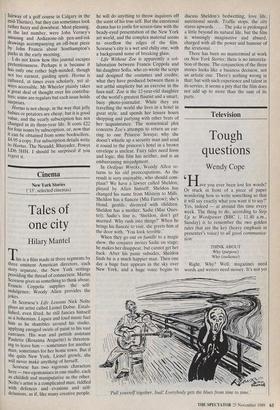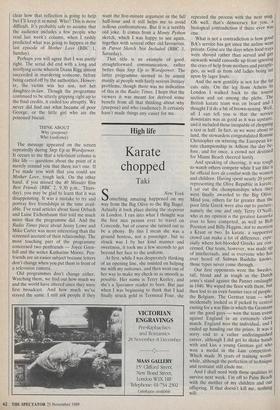Television
Tough questions
Wendy Cope
4II ave you ever been lost for words? Or stuck in front of a piece of paper wondering how to write something so that it will say exactly what you want it to say?' Yes, indeed — at around this time every week. The thing to do, according to Step Up to Wordpower (BBC 1, 11.40 a.m., Sunday) is to remember the two golden rules that are the key (heavy emphasis in presenter's voice) to all good communica- tion:
THINK ABOUT Why (purpose) Who (audience)
Right. Why? Well, magazines need words and writers need money. It's not yet 'Pull yourself together, bud! Everybody gets the blues from time to time.' clear how that reflection is going to help but I'll keep it in mind. Who? This is more difficult. It's probably safe to assume that the audience includes a few people who read last week's column, when I rashly predicted what was going to happen in the last episode of Mother Love (BBC 1, Sunday).
Perhaps you will agree that I was partly right. The serial did end with a long and terrifying scene wherein Diana Rigg almost succeeded in murdering someone, before being carted off by the authorities. Howev- er, the victim was her son, not her daughter-in-law. Though the programme continued to be utterly gripping right up to the final credits, it ended too abruptly. We never did find out what became of poor George, or the little girl who ate the poisoned biscuit.
THINK ABOUT Why (purpose) Who (audience)
The message appeared on the screen repeatedly during Step Up to Wordpower. It occurs to me that a television column is like life — questions about the point of it merely remind you that there isn't one. If I've made you wish that you could see Mother Love, tough luck. On the other hand, if you missed the 40 Minutes film Best Friends (BBC 2, 9.30 p.m., Thurs- day), you may be glad to learn that it was disappointing. It was a mistake to try and portray five friendships in the time avail- able. I've read articles about Susie Orbach and Luise Eichenbaum that told me much more than the programme did. And the Radio Times piece about Jenny Lowe and Mike Carter was more interesting than the screened account of their relationship. The most touching part of the programme concerned two penfriends — Joyce Gren- fell and the writer Katharine Moore. Pen- friends are an easier subject because letters don't change when you put them in front of a television camera.
Old programmes don't change either. Watching them, we find out how much we and the world have altered since they were first broadcast. And how much we've stayed the same. I still ask people if they
want the five-minute argument or the full half-hour and it still helps me to avoid tedious confrontations. But it is a terribly old joke. It comes from a Monty Python sketch, which I was happy to see again, together with several other old favourites, in Parrot Sketch Not Included (BBC 1, Saturday).
That title is an example of good, straightforward communication, rather better than Step Up to Wordpower. The latter programme seemed to be aimed mainly at people with fairly serious literacy problems, though there was no indication of this in the Radio Times. I hope that the viewers it was meant for derived some benefit from all that thinking about why (purpose) and who (audience). It certainly hasn't made things any easier for me.











































































 Previous page
Previous page